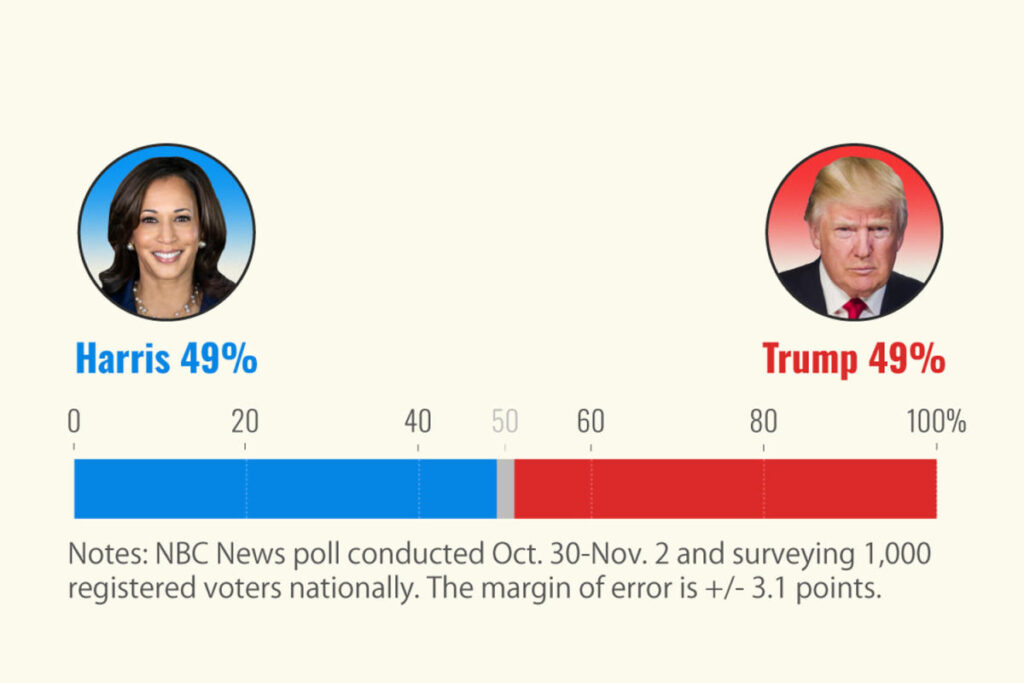The final national NBC News poll for the 2024 presidential campaign indicates a tightly contested race, showing Democratic Vice President Kamala Harris and former Republican President Donald Trump in a deadlock at 49% each among registered voters. The poll reflects a complex dynamic with factors benefiting both candidates. Harris garners support from rising Democratic enthusiasm, notably a significant advantage of 20 points over Trump on abortion, and she is perceived as better suited to appeal to the middle class. On the other hand, Trump benefits from widespread voter discontent regarding the country’s trajectory, a favorable retrospective of his presidency compared to that of President Joe Biden, and an edge over Harris on economic issues, particularly the rising cost of living. This national polarization is underscored by a glaring gender gap, with a stark division of over 30 points between men and women supporting different candidates, which further illustrates the depth of the country’s political divide.
Despite the frenetic campaigning and extensive advertising in the final stretch leading up to the election, the poll shows remarkable stability in voter preferences, opposed to significant shifts from prior months. Pollsters Jeff Horwitt and Bill McInturff noted that both candidates have solidified their core support, indicating that voters have clearly chosen their sides. The last NBC News poll in October similarly recorded a tie at 48% for each contender, emphasizing the consistency in voter sentiment as the election approaches. An expanded ballot including third-party candidates suggests a slight edge for Trump at 47% to Harris’s 46%, underscoring that a substantial number of voters remain undecided or favor alternatives.
Turnout dynamics may ultimately determine the outcome of this election, given that small variations in voter participation can heavily influence results. The NBC poll offers scenarios where, in a more favorable context for Republicans, characterized by higher turnout among male, white, and non-college-educated voters, Trump leads by 2 points. Conversely, if turnout is more favorable for Democrats, particularly among women and educated white voters, Harris holds a slight lead of 3 points. All results fall within the margin of error, highlighting the precariousness of the race. In critical battleground states vital for electoral success, polling suggests equally close margins but with unprecedented uncertainty as both parties aim to mobilize their respective bases.
The stark contrasts in gender voting patterns stand out in the NBC News survey, where Harris enjoys significant support from Black voters (87%-9%) and younger voters under 30 (57%-41%), while Trump appeals more to rural (75%-23%) and white voters without college degrees (64%-34%). An alarming 34-point gender gap signifies that women favor Harris significantly more than men do Trump, arranging the broader contest into clear factions. This division is exacerbated by less pronounced but relevant gaps among independents and Latino voters, with Harris ahead among independents (51%-43%) and retaining a narrower margin among Latino voters (53%-44%).
In terms of key issues, Kamala Harris holds a pronounced advantage regarding abortion and the middle class, where she leads by significant margins. However, Trump demonstrates robust support on economic matters, such as the cost of living, where he prevails by double-digit margins. Both candidates are perceived similarly concerning change and effectiveness, with only slight variations in voters’ evaluations of their competency. This competitive dynamic comes amidst a broader assessment of the sitting president, Joe Biden, whose job approval has dipped to 41%, marking a slight decrease since October. Voter apprehensions associated with Biden’s policies shape perceptions about Harris’s potential presidency, generating concern that she might perpetuate his approach, particularly among voters vying for change.
Ahead of Election Day, the poll reveals that over half of registered voters have already cast their ballots, with Harris leading Trump among early voters by 7 points. This contrasts sharply with prior election cycles, highlighting a robust push from both parties to secure early engagement from their supporters. However, among those intending to vote on Election Day, Trump retains a significant advantage, reflecting strategic outreach efforts targeting this critical voter demographic. The simplicity of the electoral situation is rife with complexity, as a substantial majority believe that regardless of the election’s outcome, the nation will remain divided. Voter dissatisfaction permeates both candidates’ popularity ratings, suggesting that neither may fulfill the electorate’s broader aspirations for unity.
As per the NBC News poll, the public is equally divided over Congressional preferences, with a slight favor for Democratic control. While Harris and Trump have nearly equivalent favorability ratings, the margin of error complicates the interpretation of these findings, indicating a closely matched race that could tilt in numerous directions based on the turnout and voter engagement within essential demographics. The poll, conducted with a margin of error of 3.1 percentage points, encapsulates a moment of tension and uncertainty as voters prepare for an election that will determine not only the presidency but potentially the ideological direction of the nation.

